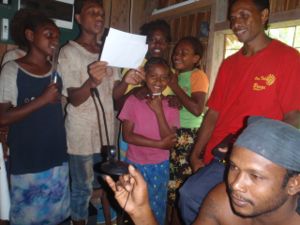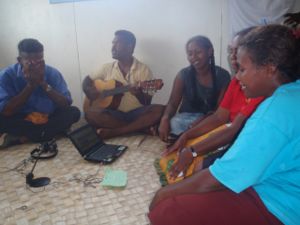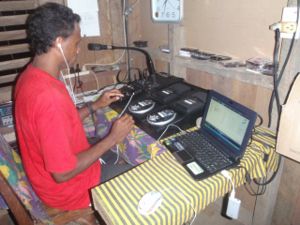Community Media/Isabel/Content Workshops
Contents
Content and Skills Development Workshops
As a follow-up to the programme design workshop held in Buala in October (2009), workshops will be run in four Isabel communities to operationalise the community learning programme design plans on different health topics identified: diabetes, waste management & sanitation, reproductive health. These follow-up workshops will focus on developing the content for the programmes and train local programme teams in the key skills areas required to run the programmes on a regular basis.
Tataba and Susubona, Nov 2009

|

|

|
Workshops were held in Tataba and Susubona in November 2009, to (in each location):
- Review, improve and complete the learning programmes designed earlier in Buala
- Produce the first programme of the series of 10-12 weekly programmes as an example for the local production team
- Provide content and technical skills training
- Agree on an operation plan with budget and timeline
The full reports can be accessed below.
Kia and Buala, Jan 2010
This will be created by Walter and Tony
Workshop Reports and Outcomes
Please click to view workshop reports and operational plans
- Tataba, workshop held Nov 16-19 2009
- Susubona, workshop held Nov 20-25 2009
- Kia, workshop to be held in January 2010
- Buala, workshop to be held in January 2010
Implementation
PFNet, SIDT, Isabel Province Health Services and Youth Division and David Leeming, facilitating consultant.
Objectives
- Share the basic principles of community learning programmes
- Review and revise the programme design plans, including operational considerations
- Develop content for the programmes:
- complete at least two full programmes,
- prepare content for an additional four programmes and
- detailed plans for at least twelve programmes
- Operationalise learner support mechanisms (e.g. listener groups, school support, etc.)
- Train a local programme team (with media, health, community and education representatives) in key skills enabling them to run the programme on an on-going basis
- Introduce and popularize the programmes with the wider community
- Link the programmes to health services at the provincial and national level
Key skills areas (see training plan)
- Interviews
- Role play and drama
- Quiz formats
- Music recording
- Technical skills: production, editing
- Facilitation skills (for learner support groups)
- Community learning programme design/development (including work on committee, governance, budget etc)
Local participation
- 12 core participants drawn from station operators, radio volunteers, health workers, and target group representatives (e.g. diabetics, youth, women, etc.)
- Substantial interactions with committees (especially the chairpersons) village leaders, schools, other health workers
- Representatives from other communities: Sisiga and Samasoda at Kia; Lelegia and Kolutubi at Susubona; Sigana at Tataba; Guguha at Buala
Workshop formats
- Hands-on content creation
- Small group work
- Community interactions
Facilitation team
- 3-4 people with organising, radio and drama skills; health knowledge
- PFNet, SIDT
- Ministry of Health, Isabel Health Services
- SIBC, Solmas